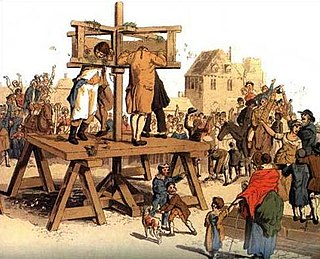热门问题
时间线
聊天
视角
羞辱
来自维基百科,自由的百科全书
Remove ads
羞辱指贬抑一个人的自尊、傲气,以使对方感到羞愧、导致自卑的心态、地位降低或变得顺从。它可以通过恐吓、身体或精神虐待或欺诈施予他人,亦可以是有人被发现犯下社会或法律上不被接受的行为而产生的尴尬。比较起来,谦逊是自愿地降低自己的自尊,而羞辱则是对他者所作的行为,且对方通常非自愿。

特定形式


侮辱另一个人,通常是一个人彰显权力的一种方式,尤其在警队、军队或监狱等环境下,是一种被用作合法审问或非法拷问的手段,亦是一种常见的压迫、滥权或至虐待的形式。很多现已废弃的公开处罚方式固意设计成含羞辱成分,例如在违法分子身上涂柏油和粘羽毛、颈手枷、羞耻徽章(社会耻辱)以作“杀一儆百”之用。其中一些手法,如涂柏油和粘羽毛成为私刑的常用手段。在一些民间习俗,如英式示众游行Skimmington及Rough music,以及法式相等的瞎闹音乐Charivari,古意夸张地当众表示道德上不赞同有违者以作羞辱之效,从而把他们赶出社区。[1]
像例如在中国历史上,南朝宋的宋明帝刘彧在登基为皇帝前,曾因体型肥胖之故而被前废帝刘子业给冠上“猪王”的称号,并曾被刘子业当成猪一般地羞辱。刘子业还曾一度因为刘彧惹火自己,而命人将裸体的刘彧用竹杖绑住四肢抬付太官[2],说:“即日屠猪。”打算以杀猪为借口将刘彧给除掉;但这时刘休仁在旁笑说:“猪今日未应死。”刘子业问何故,刘休仁答说:“待皇太子生,杀猪取其肝肺。”刘子业听后怒火渐息,于是命人将刘彧交付廷尉,因此刘彧逃过死劫。[3]
美国部分州份曾尝试透过公布不法分子的名子和罪状(如娼妓或酒后驾车)来侮辱或者羞辱他们。在2010年的广东东莞,中国警方逮捕了一些妓女并为羞辱她们而游街示众,舆论哗然。国家公安部谴责当地警察并表明这样的惩罚是不允许的。[4]
Remove ads
人我关系

唐纳德·克莱因(Donald Klein)形容羞辱为“一种强大的人事要素,但在各种因素下,常被‘个人和集体行为’的学生们忽视。它是在个人、群体及国家行为表态之间,一股具渗透性且极具破坏性的影响力。”[5]
虽然是一种主观情感,但人类普遍都会感到屈辱:“这是一股被贬低、失去自我的感觉。” [6]
被羞辱,尤其是被公开地羞辱,后果可能极其严重。一个被严重地侮辱的人可能会患上严重抑郁、自杀倾向、严重焦虑症状如创伤后压力症候群。失去一定社会地位,例如失业或被(正确或错误地)当作罪犯,可能使人无法再于自己的社群当中正常生活。受辱的人可能会被激怒而渴望报复,一些人会感到生命无意义、无望且无助,甚至产生幻觉或轻生。[7]
屈辱的情感可能使人出现“羞辱愤怒”(humiliated fury)[8],向内蔓延可能导致冷漠和抑郁,而向外扩展则可能使人变得偏执、残暴和产生复仇的幻想。克莱因解释:“当它向外发泄,羞辱愤怒会不幸地创造更多的受害者,通常包括无辜的旁观者……当向内渲发,所产生的自我憎恨会使受害者不能满足自己的需要,更不用说拥有爱和关心他人的能力。”他续道:“无论在哪一情况下,那些被羞辱愤怒情神耗尽的人会全神贯注于这愤怒或其因由上,被受伤的自尊心所包围……”[5]
不是一切羞辱的行为都是故意的。有时,屈辱的情绪可能只是因为误解。
参见
参考
延伸阅读
外部链接
Wikiwand - on
Seamless Wikipedia browsing. On steroids.
Remove ads
